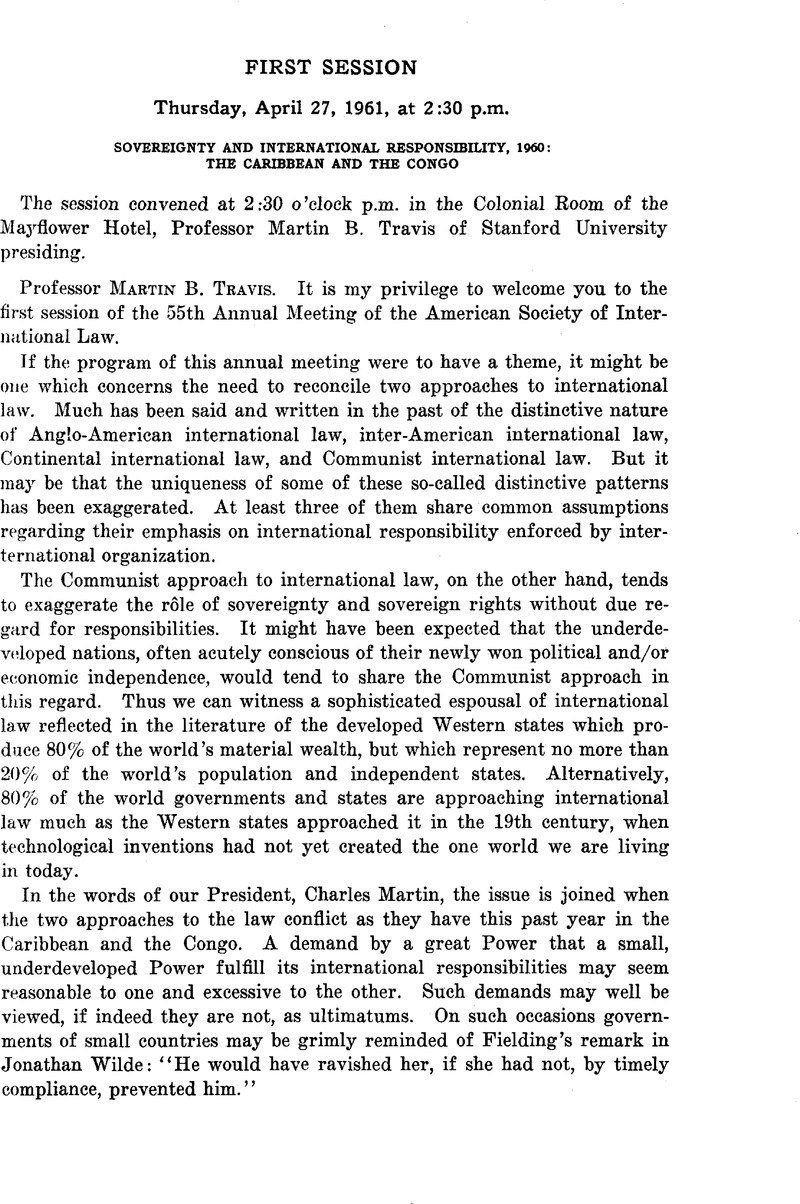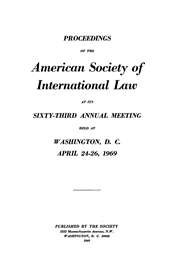No CrossRef data available.
Article contents
Intervention and Cuba in 1961
Published online by Cambridge University Press: 27 February 2017
Abstract

- Type
- First Session
- Information
- Copyright
- Copyright © American Society of International Law 1961
References
1 The writer has attempted to answer this question in regard to a number of these incidents. “ I s Discussion Intervention?”, 50 A.J.I.L. 102 (1956); “Intervention, 195,” 51 ibid. 257 (1957); “The Legality of Intervention Under the United Nations Charter,” 1957 A.S.I.L. Proceedings 79; “Eeeognition, Intervention and Ideologies,“ 195K Indian Year Book of International Affairs 1; “United States Intervention in the Lebanon,” 53 A.J.I.L. 112 (1959); “International Law and Civil Strife,” 1959 A.S.I.L. Proceedings 145; “Subversive Intervention,” 54 A.J.I.L. 521 (1960); “Legal Aspects of the U-2 Incident,” ibid. 836.
2 The Lotus, 1927, P.C.I.J., Ser. A, No. 10, p. 19; 2 Hudson, World Court Eeports 35.
3 28 Dept. of State Bulletin 599 (1953).
4 For contrary position, see Julius Stone, Aggression and World Order (1958).
5 See Q. Wright, “The Prevention of Aggression,” 50 A.J.I.L. 514 (1956).
6 A resolution of the Institute of International Law in 1959 declared that “recourse to tlie International Court of Justice or to another international court or arbitral tribunal can never be regarded as an unfriendly act towards the respondent State.” 2 Annuaire (1959) 381.
7 Q. Wright, “The Strengthening of International Law,” 98 Hague Academy of International Law, Eecueil des Cours 84, 197 ff. (1959).
8 Ibid. 95, 163.
9 Ibid. 168.
10 See Julius Stone, op. tit., note 4.
11 See Louis B. Sohn, “The Definition of Aggression,” 45 Virginia Law Review 677 ff. (1959) ; Wright, loc. cit. note 7 above, p. 163.
12 In the United Nations it has usually been assumed that a “recommendation” by one of its organs, criticizing the behavior of a state or urging other states to bring pressure upon it, constitutes “ intervention.” Wright, note 7 above, p. 203.
13 Note 7 above and note 19 below.
14 See 48 A.J.I.L. 289 ff. (1954), and ibid., Supp. 127.
15 Q. Wright, “International Law and Civil Strife / ‘ note 1 above, pp. 149 ff.
16 Q. Wright, “ The Stimson Note of January 7, 1932,” 26 A. J XL. 342 ff. (1932).
17 H. Lauterpacht, Eecognition in International Law 426 (Cambridge, 1947).
18 The Naulilaa Incident (Portugal v. Germany), 1928; Herbert Briggs, The Law of Nations 951 (2nd ed., New York, 1952). The U.S. District Court for the Southern District of New York held in April, 1961, that the United States retorsionary action reducing the Cuban sugar quota, although intended “ to impose” sanctions on a government which Congress believed unfriendly, “ was not a violation of international law,” but the Cuban law of July 7, 1960, nationalizing the property of American citizens in Cuba, expressly intended as a reprisal against this “economic and political aggression” of the United States, was such a violation. The Executive formally protested it (43 Dept. of State Bulletin 171 (I960)), and the court considered it illegal because there was no adequate public purpose or compensation, and the effect was discriminatory, being directed only against American nationals, and improper in penalizing individuals for acts of their government. Consequently the court held the nationalization act invalid and refused to recognize titles to property in New York acquired in Cuba from the Cuban Government after nationalization. Banco Nacional de Cuba v. Sabbatino, March 31, 1961, 29 U. S. Law Week 2469.
19 Note 7 above.
20 Walter Lippmann, Washington Post, April 18, 1961.
21 See Q. Wright, “The Crime of ‘War-Mongering,’ “ 42 A.J.I.L. 128 ff. (1948); “Subversive Intervention,” note 1 above, pp. 523, 532.
22 Dennis v. U.S., 341 U.S. 494, 1951; C. Herman Pritehett, Civil Liberties and the Vinson Court 71 ff. (University of Chicago Press, 1954).
23 Q. Wright, “ Subversive Intervention,’ note 1 above.
24 Idem, “ Legal Aspects of the U-2 Incident,” note 1 above.
25 7 Hudson, International Legislation 409, 862.
26 Charles G. Fenwick, “Proposed Control over Radio as an Inter-American Duty in Cases of Civil Strife,” 48 A.J.I.L. 289 (1954).
27 Note 21 above.
28 A survey of over thirty such interventions from 1898 to 1933 concludes that the policy was not effective in advancing either the security goal for which it was originally adopted or the later goal of promoting free elections as an end in themselves, but created distrust of the United States in Latin America, and was dropped as an element of President Franklin Eoosevelt's Good Neighbor policy. Theodore P. Wright, Jr., “Free Elections in the Latin American Policy of the United States,” 74 Political Science Quarterly 89, 111 (1959).
29 4 Hudson, International Legislation 2418; 22 A.J.I.L. Supp. 159 (1928).
30 6 Hudson, op. cit. 450; 28 A.J.I.L. Supp. 79 (1934).
31 6 Hudson, op. cit. 623; 28 A.J.I.L. Supp. 75 (1934).
32 6 Hudson, op. cit. 628; 31 A.J.I.L. Supp. 57 (1937).
33 7 Hudson, op. cit. 578; 31 A.J.I.L. Supp. 59 (1937).
34 46 A.J.I.L. Supp. 46 (1952).
35 48 ibid. 123 ff. (1954).
36 C. G. Fenwick, “Jurisdictional Questions Involved in the Guatemalan Resolution,’ 48 A.J.I.L. 597 ff. (1954); 8 International Organization 514 fl., 611 (1954).
37 55 A.J.I.L. 537-538 (1961).
38 Dept. of State Document on the Castro Begime, New York Times, April 3, 1961.
39 Note 18 above.
40 New York Times, April 4, 1961, p. 14.
41 A detailed report from Tad Szulc in Miami, printed in the New York Times of April 22, states: “As has been an open secret in Florida and Central America for months, the C.I.A. planned, coordinated and directed the operations that ended in the defeat on a beachhead in Southern Cuba Wednesday (April 19)… . The rebel troops began to be trained in Guatemala under C.I.A. supervision about last May. The ranks of the revolutionary army swelled as the months went by, reaching strength in recent weeks as a mobilization order was issued by the Revolutionary Council in New York…. A United States Army Colonel commanded the training… . Some of the Cuban officers were sent to the United States Army's Jungle Warfare School in Panama… . When the Revolutionary Council ordered a purge of men who were once supporters of the former dictator Fulgeneio Batista, C.I.A. agents were reported to be reluctant to give up trained personnel to satisfy political requirements. Charges were constantly heard in Miami that Batista supporters held high positions in the camps. Ten days before the landings a gun battle was reported to have occurred in one of them. That a landing was imminent this month was known to almost all Cubans in this area. This included at least 100 known Castro intelligence agents. Although local law-enforcement agencies even had their photographs, Federal authorities made no visible effort to remove them. As troops from Guatemala and from smaller camps in Louisiana and Florida began to move to jump-off points in the Caribbean in the first weeks in April, the rebel leaders sounded urgent warnings against an invasion attempt. They argued forcefully with C.I.A. agents and other United States authorities that any substantial landing should be preceded by a softening-up compaign of sabotage… . Early last week, however, the preparations for a landing went into high gear just as a major sabotage campaign began in Cuba. These last minute preparations were kept a secret from the underground organizations not favored by the C.I.A… . In New York the members of the Revolutionary Council, meeting at the Hotel Lexington, were spirited out through the back door by ten C.I.A. agents Sunday afternoon (April 16) and taken to secret spots to await the moment to land on the beachhead… . The invading force was reported to have jumped off, among other points, from the islands of Great Corn and Little Corn off the coast of Nicaragua. The islands belong to Nicaragua, but they have been on ninety-nine year lease to the United States since 1916… . As the rebels sailed toward the beachhead, several hundred anti-Castro fighters were being held in Miami for no apparent reason. … For reasons that were not made clear, perhaps as many as 100 officers and men from the Guatemalan camps, including airmen, were brought to Miami several weeks ago and told to remain with friends or at motels, each receiving $50 weekly. One of the important criticisms of the landing operation was that it was not accompanied by broadcasts into Cuba urging the people to rise and informing them who was leading the attack. This, it was stressed, left Cubans in a state of uncertainty and confusion, compounded by broadcasts of Radio Swan, a C.I.A. operated propaganda station on Swan Island, claiming victories and up-risings that were not actually happening. ‘People could not take chances on exposing themselves not knowing what was happening,’ a rebel leader has said.” See also comments by Chalmers Roberts, Washington Post, April 18, 20, 23, and James Reston, New York Times, April 2, 21. The President's investigation, announced on April 24, under General Maxwell D. Taylor, assisted by Attorney General Robert F. Kennedy, Central Intelligence Director Allen W. Dulles, and Chief of Naval Operations Arleigh A. Burke, seems, from its commission and its personnel, more likely to throw light on the strategic and tactical inadequacies of the fiasco and the reorganization of “paramilitary operations,” which include espionage, sabotage and other underground activities, than on the legal responsibility of the United States for its participation, which, if the report just quoted is correct, seems to have been extensive.
42 “Any combination of men organized here to go to Cuba to make war upon its government, provided with arms and ammunition, we being at peace with Cuba, constitutes a military expedition.” Wiborg v. U.S. (1896), 163 U.S. 632, 653-654; 7 Moore, Digest of International Law 912. For proposed definitions of aggression, including negligence in preventing “armed bands” with political objectives from leaving a state's territory, see Stone, op. cit. note 4 above, appendix. “Failure of a government to prevent armed bands of insurgents from organizing within its territory to engage in hostilities across a frontier, will make it responsible for aggression, if such hostilities actually occur.” Q. Wright, loo. cit. note 7 above, p. 165.
43 “Historicus,” Letters on Some Questions of International Law, London, 1863, p. 41.
44 Note 28 above.




